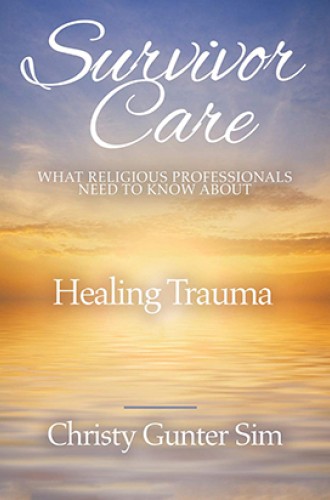Trauma survivors are in your congregation. How will you help them heal?
Christy Gunter Sim, a trauma expert and domestic violence survivor, offers case studies for church leaders.
When I told my 89-year-old mother that the book I was reading offered guidelines for when a parishioner is a victim of domestic violence, she was confused. “That doesn’t make sense,” she said. “There’s no domestic violence in churches.”
My saintly mother had fallen prey to a common faulty assumption. While it’s painful to imagine that a fellow worshiper might go home to verbal or physical abuse—or that a person we greet during the passing of the peace might be an abuser—statistics tell us that this is probable. If churches are to be places of healing, people of faith must bring gender-based violence out of the shadows. As a trauma expert who is also a Christian and a survivor of domestic violence, Christy Sim offers wisdom that equips church leaders to do just that.
Sim’s starting point is human biology. It is essential to understand the ways our bodies respond to threats of violence, as well as to actual physical violence. For trauma survivors, these normal biological responses can cause long-lasting effects that bleed into the inner life, causing shame, self-doubt, confusion, isolation, objectification, and the loss of power and control.
A meaty chapter delves into neurology and makes the topic accessible to nonscientists. Viewing the brain through a “trauma lens,” Sim describes the effects of trauma on the brain’s three major regions: the cerebral cortex and neocortex (cognitive response), the limbic system, including the amygdala and hippocampus (emotional response), and the brain stem and cerebellum (primitive response). The brain’s “high road” is cognition, while the “low road” includes the unconscious associations our bodies make in response to threats, driven by the amygdala. While these shortcuts often save our lives (e.g., toddlers learn not to run into traffic), trauma survivors can later become disabled by their low-road responses—a sight or smell can trigger an instinctive response.
Sim also discusses the role of stress hormones, which linger in the body for days and cause victims to act in ways that may puzzle those trying to help: doing things that seem irrational, acting as if nothing happened, or even laughing inappropriately. She explains why it is important for pastoral caregivers to know the science of trauma:
Many of the behaviors we judge as problematic are actually biologically based and are how our bodies are designed to respond to threat. It is what keeps us alive. When we judge a person’s biology, we become part of the problem and cause secondary harm (if not secondary trauma).
The practical application here is crucial. Pastors need to move beyond an emphasis on talk therapy (which is cognition-based) and help survivors access tools that engage traumatic memories as they come in through the low road (which lies outside the realm of cognition).
How does healing from sexual violence take place? Sim offers four recommendations: “Use ceremony to release pain and facilitate healing. Tell stories to enable the survivor to feel seen, heard, and felt. Create opportunities that do not require active problem solving or analyzing. Employ methods of consolidation or integration.” Healing is best accessed through a playful approach which includes body movement, artistic creations, writing, and mindfulness.
Sim’s chapter on vicarious trauma—sometimes known as compassion fatigue—may be of special interest to clergy who work with vulnerable populations and frequently deal with abuse and violence. Her self-care plan includes becoming self-aware, identifying triggers, and using body work to help release physical tension (including such techniques as EMDR and EFT, often referred to as tapping therapy). She also reminds clergy of the power they have. “As we practice pastoral care among vulnerable populations, we admit the responsibilities that come with having power, and we honor the sacredness of being able to help.”
In one of the book’s rubber-meets-the-road chapters, Sim lays out the various service providers and medical and court advocates a clergyperson might encounter when walking with victims. She discusses confidentiality, which is sometimes a hindrance to clergy who are unfamiliar with the protocols of domestic violence shelters. She also provides a “When to Refer” list, a section on protection orders, and a sample confidentiality waiver agreement. The book’s 13 appendices provide other practical helps, such as safety plans, a crisis moment checklist, false reporting statistics, and how to actively listen with survivors.
One of the book’s strengths is the inclusion of a case study in each chapter, which spurs readers to think through potential scenarios. What would I do if a victim of domestic violence told me she was pressing charges and then changed her mind? What would I say to a mother of three who tells me she intends to leave a violent, or potentially violent, partner but doesn’t know how? How would I respond if an enraged spouse who lost custody of his children entered the sanctuary during a worship service?
In her final chapter, Sim soberly reminds readers that a violent person can walk through the doors of a church at any time, that parking lots are dangerous places, and that prayer is a “soft spot,” meaning a place of vulnerability. Church leaders often have an intuitive sense of the general steps involved in helping trauma survivors move toward healing—banish shame, repair self-esteem, overcome isolation, and promote justice. But knowing something in theory isn’t the same as having practical knowledge to apply to real situations. Survivor Care is an excellent tool for church leaders who seek to bridge the gap between theory and practice.






